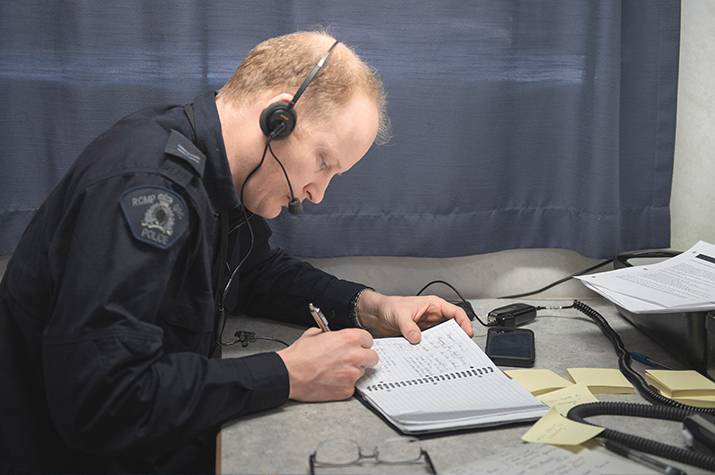Crisis negotiators fine-tune skills at annual training
By Travis Poland

RCMP crisis negotiators must keep their skills sharp as a call can come at any time.
Image by RCMP
July 1, 2019
Content
RCMP crisis negotiators help diffuse tense and high-stakes situations — and frequent training keeps them at their best.
To help negotiators stay up to date with the latest techniques, the RCMP National Critical Incident Program holds an annual crisis negotiation workshop where nearly 60 officers from across Canada converge at the RCMP's training academy for lectures and live-scenario workshops.
The sessions gives crisis negotiators the chance to practise active listening and rapport-building skills.
"These abilities need to be kept sharp and hands-on scenario training is one of the best ways," says Sergeant Ed Jobson, co-ordinator of the National Crisis Negotiation Program.
As part of the National Critical Incident Program, crisis negotiators work under an incident commander and alongside the Emergency Response Team on calls ranging from barricaded persons and distraught individuals to hostage situations and kidnappings. The training prepares negotiators for these and other scenarios.
Hostage scenario
This year, the workshop focused on terrorism. Members from the Integrated National Security Enforcement Team lectured on religious extremism and assisted with a workshop involving a mock hostage situation.
"These are situations you hope you never face but we need to train and prepare for," says Jobson. "The skills needed for these circumstances apply to many negotiations."
The workshops use actors and scripts to mimic a real situation allowing officers to practise effective listening and responses.
"The actors respond based on what the negotiator says and the negotiation must be performed well," says RCMP Corps Sergeant Major Al McCambridge, a course facilitator who has been involved in more than 100 negotiations as a crisis negotiator for the past 28 years.
"It forces you to brainstorm and stretch your knowledge and skill set," says RCMP Corporal Kent Hall, who's been on a crisis negotiation team for four years and became a negotiator a year ago. "The scenarios feel real and we have to give max effort."
While overseen on the national level, each province is responsible for its crisis negotiation teams. The national workshop offers training that is sometimes inaccessible to certain provinces.
Training with other crisis negotiators allows everyone to study and learn.
"This gives us a chance to review everything from logistics and team construction to debriefing," says Hall, who's based in Kelowna, British Columbia. "We learn what works for other teams and it makes us all better."
The information from the national workshops is then shared with provincial team members.
Members of other Canadian police forces fill a handful of seats at the workshop and prepare negotiators for working with officers throughout Canada.
Crisis negotiators must work well on a team because the situations to which they're deployed have many moving parts. And the same goes for the training, even though many at the workshop had just met.
"We had to come together and put ideas forward and that was really productive," says Hall.
New challenges, new skills
The course changes every year with new obstacles and challenges.
"We assess what's happening around the world and stay up to date with current trends and techniques," says Jobson. "Not every negotiation is done over the phone anymore. We now train and practise with social media and text-based tactics."
Hall says meeting with long-time crisis negotiators is a fruitful aspect of the course.
"They know additional things from their experience and it reminds you that you have to look at the unexpected outcomes," says Hall.
Nearly 150 RCMP officers volunteer to be crisis negotiators. Negotiators are first trained at the Canadian Police College in Ottawa and must have at least six days of training each year.